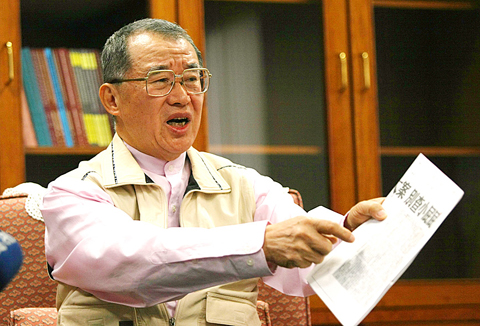Control Yuan President Wang Chien-shien yesterday defended himself against media speculation that he had urged Control Yuan members to focus on high-profile cases and put aside less prominent ones.
Wang said at a press conference in Taipei that he had done nothing more than advising Control Yuan members to establish their own investigation priorities.
“Given the limited manpower [of the Control Yuan], I asked the members to put aside cases of personal interest so that they could investigate cases that are more important,” he said.

PHOTO: CNA
Wang added that he did not have the authority to set priorities for every Control Yuan member.
Wang was responding to a report in yesterday’s Chinese-language China Times that said Wang had asked Control Yuan members at internal meetings to probe “big impeachment cases,” dismissing petitions from members of the public as “little farts (小屁屁).”
With a copy of the report in hand, Wang dismissed the claim, saying: “I might have used the term during internal meetings, as it sounds like a phrase I might have used, but I have never described the public’s petitions as ‘little farts.’”
Wang said the Control Yuan needed to amend the Organic Law of the Control Yuan (監察院組織法) to enable the government body to hire more personnel before it could adequately handle people’s complaints about the government.
Wang said the Control Yuan was dealing with 304 impeachment investigations — twice the number of impeachment cases the Control Yuan had dealt with annually over the past 12 years.
Earlier yesterday, Chinese Nationalist Party (KMT) Legislator Chiu Yi (邱毅) said Wang’s approach was “outdated” and that every public petition should be treated as a high-profile case.
KMT caucus secretary-general Chang Sho-wen (張碩文) urged Wang to apologize to the public for the remark, saying it was the Control Yuan’s responsibility to deal with every single complaint from the public.
Democratic Progressive Party (DPP) Legislator Pan Meng-an (潘孟安) told a separate press conference that the Control Yuan used a committee system under which members exercise their rights independently, which meant that Wang did not have the power to tell members which cases should be probed.
DPP Legislator William Lai (賴清德) said the Control Yuan existed to resolve people’s problems and complaints, and should threfore take small cases seriously.
Wang’s remark was tantamount to announcing the death of the Control Yuan, Lai said.
He said that under Wang’s leadership the Control Yuan had become focused on probing political cases involving former DPP officials.
DPP Legislator Chen Ting-fei (陳亭妃) said the Control Yuan was neglecting scandals involving KMT officials.
These included the controversial Maokong Gondola, the KMT’s sale of its Institute of Policy Research and Development building to Yuan Lih Construction Corp and KMT Lawmaker Diane Lee’s (李慶安) alleged dual citizenship, Chen said.

RESOLUTIONS DEBATE: Taiwan’s allies said that UN and WHA resolutions cited by China and other nations ‘do not determine Taiwan’s participation in WHO activities’ A proposal to invite Taiwan to this year’s World Health Assembly (WHA) was rejected on Monday, resulting in Taipei’s absence from the annual meeting for a ninth consecutive year, although partners spoke up for Taiwan’s participation at the first day of the meeting. The first agenda item after the opening was a “two-on-two debate” on a proposal to invite Taiwan to participate at the WHA as an observer. Similar to previous years, two countries made statements in favor of the proposal, while two others expressed their opposition. Philippine Secretary of Health Teodoro Herbosa, president of the 78th WHA, accepted the WHA General Committee’s

Palauan President Surangel Whipps Jr arrived in Taiwan last night to kick off his first visit to the country since beginning his second term earlier this year. After arriving at Taoyuan International Airport at around 6:30 pm, Whipps and his delegation were welcomed by Minister of Foreign Affairs Lin Chia-lung (林佳龍). Speaking to gathered media, the Palauan leader said he was excited and honored to be back in Taiwan on his first state visit to Taiwan since he was sworn in this January. Among those traveling with Whipps is Minister of State Gustav N. Aitaro, Public Infrastructure

Premier Cho Jung-tai (卓榮泰) on Friday laid out the Cabinet’s updated policy agenda and recapped the government’s achievements ahead of the one-year anniversary of President William Lai’s (賴清德) inauguration. Cho said the government had made progress across a range of areas, including rebuilding Hualien, cracking down on fraud, improving pedestrian safety and promoting economic growth. “I hope the public will not have the impression that the Cabinet only asked the legislature to reconsider a bunch of legal amendments,” Cho said, calling the moves “necessary” to protect constitutional governance and the public’s interest. The Cabinet would work toward achieving its “1+7” plan, he said. The

Nvidia founder and CEO Jensen Huang (黃仁勳) hosted a dinner in Taipei last night with key Taiwanese suppliers to celebrate the successful mass production of the company’s new Blackwell AI systems. Speaking to the media earlier yesterday, Huang thanked Nvidia’s Taiwanese partners for their contributions to the company’s ecosystem, while also sharing his plans to meet with Taiwan Semiconductor Manufacturing Co (TSMC) founder Morris Chang (張忠謀). In response to rumors that Nvidia will launch a downgraded Hopper H20 chip for China in July, Huang dismissed the reports, saying, “That is not true.” He clarified that there